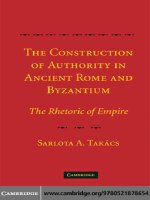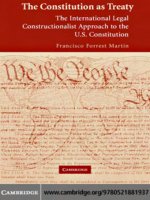cambridge university press soviet legal innovations and the law of the western world sep 2007 kho tài liệu bách khoa
Bạn đang xem bản rút gọn của tài liệu. Xem và tải ngay bản đầy đủ của tài liệu tại đây (1.54 MB, 276 trang )
This page intentionally left blank
P1: KNP
9780521881746pre
CUFX158/Quigley
978 0 521 88174 6
July 31, 2007
SOVIET LEGAL INNOVATION AND THE LAW OF THE
WESTERN WORLD
The government of Soviet Russia wrote new laws for Russia that were as revolutionary as its political philosophy. These new laws challenged social relations
as they had developed in Europe over centuries. These laws generated intense
interest in the West. To some, they were the harbinger of what should be done
in the West and, hence, a source for emulation. To others, they represented a
threat to the existing order. Western governments, like that of the Tsar, might
be at risk if they held to the old ways. Throughout the twentieth century,
Western governments remade their legal systems, incorporating an astonishing number of laws that mirrored the new Soviet laws. Western law became
radically transformed over the course of the twentieth century, largely in the
direction of change that had been charted by the government of Soviet Russia.
John Quigley is the President’s Club Professor in Law at the Moritz College
of Law at the Ohio State University. After earning his A.B., LL.B., and M.A.
at Harvard University, he was an instructor in Russian at Massachusetts Institute of Technology, a Research Fellow at the faculty of law of Moscow State
University, and a research associate at Harvard Law School and has written
three books regarding Russian law. He has served as the editor of the Bulletin on
Current Research in Soviet and East European Law and has published numerous
articles on Soviet law.
i
17:6
P1: KNP
9780521881746pre
CUFX158/Quigley
978 0 521 88174 6
July 31, 2007
OTHER BOOKS BY JOHN QUIGLEY
Basic Laws on the Structure of the Soviet State
The Soviet Foreign Trade Monopoly
Law After Revolution
Palestine and Israel: A Challenge to Justice
The Ruses for War: American Interventionism Since World War II
Flight into the Maelstrom: Soviet Immigration to Israel and Middle East
Peace
Genocide in Cambodia: Documents from the Trial of Pol Pot and Ieng
Sary
The Case for Palestine: An International Law Perspective
The Genocide Convention: An International Law Analysis
ii
17:6
P1: KNP
9780521881746pre
CUFX158/Quigley
978 0 521 88174 6
SOVIET LEGAL INNOVATION
AND THE LAW OF THE
WESTERN WORLD
John Quigley
President’s Club Professor in Law,
Moritz College of Law,
the Ohio State University
iii
July 31, 2007
17:6
CAMBRIDGE UNIVERSITY PRESS
Cambridge, New York, Melbourne, Madrid, Cape Town, Singapore, São Paulo
Cambridge University Press
The Edinburgh Building, Cambridge CB2 8RU, UK
Published in the United States of America by Cambridge University Press, New York
www.cambridge.org
Information on this title: www.cambridge.org/9780521881746
© John Quigley 2007
This publication is in copyright. Subject to statutory exception and to the provision of
relevant collective licensing agreements, no reproduction of any part may take place
without the written permission of Cambridge University Press.
First published in print format 2007
eBook (EBL)
ISBN-13 978-0-511-34161-8
ISBN-10 0-511-34161-X
eBook (EBL)
ISBN-13
ISBN-10
hardback
978-0-521-88174-6
hardback
0-521-88174-9
Cambridge University Press has no responsibility for the persistence or accuracy of urls
for external or third-party internet websites referred to in this publication, and does not
guarantee that any content on such websites is, or will remain, accurate or appropriate.
P1: KNP
9780521881746pre
CUFX158/Quigley
978 0 521 88174 6
This book is dedicated to
Harold J. Berman
v
July 31, 2007
17:6
P1: KNP
9780521881746pre
CUFX158/Quigley
978 0 521 88174 6
vi
July 31, 2007
17:6
P1: KNP
9780521881746pre
CUFX158/Quigley
978 0 521 88174 6
July 31, 2007
Contents
Abbreviations
page ix
Preface
xiii
Acknowledgments
xvii
PART ONE. THE SOVIET CHALLENGE
1 The Industrial Revolution and the Law
3
2 Economic Needs as Legal Rights
9
3 Equality in the Family
17
4 Children and the Law
27
5 Crime without Punishment
34
6 A Call to “Struggling People”
47
7 The Withering Away of Law
53
PART TWO. THE WEST ACCOMMODATES
8 Panic in the Palace
65
9 Enter the Working Class
74
10 Social Welfare Rights
87
vii
17:6
P1: KNP
9780521881746pre
CUFX158/Quigley
978 0 521 88174 6
July 31, 2007
Contents
11 The State and the Economy
95
12 Equality Comes to the Family
103
13 Child-Bearing and Rights of Children
108
14 Racial Equality
115
15 Crime and Punishment
125
PART THREE. THE BOURGEOIS INTERNATIONAL
ORDER
16 Equality of Nations
133
17 The End of Colonies
143
18 The Criminality of War
148
19 Protecting Sovereignty
158
20 Military Intervention
165
PART FOUR. LAW BEYOND THE COLD WAR
21 Triumph of Capitalist Law?
175
22 The Moorings of Western Law
180
23 The Impact of Change
188
Notes
195
Bibliography
239
Index
251
viii
17:6
P1: KNP
9780521881746pre
CUFX158/Quigley
978 0 521 88174 6
July 31, 2007
Abbreviations
The following abbreviations for frequently cited items are used in notes in lieu of
full citation.
AJIL
CEDAW
Civil Code 1922
Chloros
Constitution 1936
Criminal Code 1922
Criminal Code 1926
DSB
ESC
ESCOR
Family Code 1918
American Journal of International Law
“Convention on the Elimination of All Forms of Discrimination Against Women,” December 18, 1979,
United Nations Treaty Series, vol. 1249, p. 13
Grazhdanskii kodeks [Civil Code], SU RSFSR no. 71,
item 904 (1922)
A. G. Chloros (ed.), The Reform of Family Law in Europe
(The Equality of the Spouses – Divorce – Illegitimate Children) (Deventer: Kluwer, 1978)
USSR Constitution, confirmed by Decree of the Eighth
Extraordinary Congress of Soviets of the USSR, published in zvestiia of the Central Executive Committee of the
USSR and the All-Union Central Executive Committee,
December 6, 1936, no. 283
Ugolovnyi kodeks [Criminal Code], SU RSFSR,
no. 15, item 153 (1922)
Ugolovnyi kodeks [Criminal Code], SU RSFSR,
no. 80, item 600 (1926)
U.S. Government, Department of State Bulletin, U.S.
Government Printing Office, Washington DC
United Nations, Economic and Social Council
United Nations, Economic and Social Council Official
Records
Kodeks zakonov ob aktakh grazhdanskogo sostoianiia,
brachnom, semeinom i opekunskom prave [Code of
ix
17:6
P1: KNP
9780521881746pre
CUFX158/Quigley
978 0 521 88174 6
July 31, 2007
Abbreviations
Family Code 1926
FRUS
FRUS Paris
GA
GAOR
Labor Code 1918
Labor Code 1922
League Covenant
LNTS
PSZ
RSFSR
SC
SCOR
SGP
SU RSFSR
SSSR
Svod zakonov
SZ SSSR
x
Laws on Acts of Civil Status and on Marriage, Family,
and Guardianship Law], SU RSFSR, no. 76–77, item
818 (1918)
Kodeks zakonov o brake, sem’e i opeke [Code of
Laws on Marriage, the Family, and Guardianship], SU
RSFSR, no. 82, item 612 (1926)
Foreign Relations of the United States, U.S. Government Printing Office, Washington DC
U.S. Government, Foreign Relations of the United States:
the Paris Peace Conference 1919 (published 1943)
United Nations, General Assembly
United Nations, General Assembly Official Records
Kodeks zakonov o trude [Code of Laws on Labor], SU
RSFSR, no. 87–88, item 905 (1918)
Kodeks zakonov o trude [Code of Laws on Labor], SU
RSFSR, no. 70, item 903 (1922)
Treaty of Peace with Germany, Versailles, annex:
Covenant of the League of Nations, June 28, 1919,
Consolidated Treaty Series, vol. 225, p. 195
League of Nations Treaty Series
Polnoe sobranie zakonov Rossiiskoi imperii [Full Collection of Laws of the Russian Empire]
Rossiiskaia sovetskaia federativnaia sotsialisticheskaia respublika [Russian Soviet Federated Socialist
Republic]
United Nations, Security Council
United Nations, Security Council Official Records
Sovetskoe gosudarstvo i pravo [Soviet State and Law]
(periodical)
Sobranie uzakonenii i rasporiazhenii rabochego i
krest’ianskogo pravitel’stva RSFSR [Collection of
Enactments and Regulations of the Worker-Peasant
Government of the RSFSR]
Soiuz Sovetskikh Sotsialisticheskikh Respublik [Union
of Soviet Socialist Republics]
Svod zakonov Rossiiskoi Imperii [Collection of Laws
of the Russian Empire] (1913)
Sobranie zakonov i rasporiazhenii rabochegokrest’ianskogo pravitel’stva SSSR [Collection of Laws
and Regulations of the Worker-Peasant Government
of the USSR]
17:6
P1: KNP
9780521881746pre
CUFX158/Quigley
978 0 521 88174 6
July 31, 2007
Abbreviations
UN
UN Charter
UNTS
Vedomosti SSSR
United Nations
Charter of the United Nations, June 26, 1945, U.S.
Congress, Statutes at Large, vol. 59, p. 1031
United Nations Treaty Series
Vedomosti verkhovnogo soveta SSSR [Gazette of the
Supreme Soviet of the USSR]
xi
17:6
P1: KNP
9780521881746pre
CUFX158/Quigley
978 0 521 88174 6
xii
July 31, 2007
17:6
P1: KNP
9780521881746pre
CUFX158/Quigley
978 0 521 88174 6
July 31, 2007
Preface
In the autumn of 1887, Vladimir Ilich Ulianov, a young Russian of a
middle-class family, enrolled to study law at the Imperial Kazan University. Ulianov was not destined, however, to do well at the university.
His elder brother had just been executed for an attempt on the life
of the tsar. Like his brother, Ulianov traveled in anti-tsarist circles. At
the university, Ulianov associated with revolutionary-minded students,
and in December of 1887 he was expelled.
Ulianov did not give up on law study, however. He applied for readmission at Kazan. Refused there, he requested permission from the
government to go abroad to a university. That, too, was refused. Knowing that he would not be admitted to any Russian university in the normal way, he applied to become an external student at the university in
St. Petersburg. That route would let him qualify in law, but he would
not attend classes. He would study on his own. Ulianov’s mother wrote
a letter in support of his application, and he was admitted.
Ulianov learned and re-learned the law of tsarist Russia. Tsarist
law was distasteful to Ulianov. For him, it rationalized and reinforced unequal social relations. It ensured that the downtrodden would
remain so.
Despite his disdain, the youthful Ulianov studied what he needed to
learn of tsarist law. In 1891, he sat for the examination in St. Petersburg
to qualify for the practice of law. He not only passed, but scored the
highest possible mark on every sub-part of the examination, the only
xiii
17:6
P1: KNP
9780521881746pre
CUFX158/Quigley
978 0 521 88174 6
July 31, 2007
Preface
student that year to do so. Ulianov knew the hated law of the tsar better
than any of his peers.1
A generation later, Ulianov, by then known as Lenin, declared the
tsar’s legislation void – lock, stock, and barrel. Not an article of what
Ulianov had mastered in 1891 would remain on the books. In its place
would come new enactments, differently grounded, containing norms
that would change the face of Russia.
Beyond Russia, Lenin’s repudiation of tsarist law had worldwide
ramifications. Lenin and the Bolshevik party he headed espoused legal
concepts that challenged the foundations of Western society. The governments of the Western world did not provide a good life for their
people, the Bolsheviks charged. People could live better, more productive lives without fear of the hardships that might befall them through
the playing out of the forces of the market.
The overthrow of the tsar and his law set an uncomfortable precedent for the West. If the law of Russia could be overturned at the stroke
of a pen, what then of the law of other countries? Could the common
law of England, or the Roman law of Europe, as easily be turned aside?
As matters developed, the leaders of the Western world were able
to maintain themselves and their legal orders. But to do so, they could
not run in place. They parried Lenin’s thrusts to blunt the impact in
their realms of his biting critique of their rule. A dialectic developed
between the Soviet Union and the West. In its efforts to counter the
Soviet Union, the West absorbed many of the ideas it found threatening.
As Western leaders adjusted their policies, they changed the legal
systems of their countries. The change did not come overnight or in a
single package of new laws. Nor did it come at the same pace everywhere in the Western world. But come it did, and with a force that
would render Western law by the turn of the twenty-first century light
years different from Western law at the turn of the twentieth. Western
law did not disappear, but it did not remain the same.
This interaction between the Soviet Union and the West was little
understood when the Soviet Union departed the international scene
xiv
17:6
P1: KNP
9780521881746pre
CUFX158/Quigley
978 0 521 88174 6
July 31, 2007
Preface
in 1991. To Western leaders and to most analysts, the Soviet demise
marked the end of an unpleasant episode, without a tomorrow. The
Soviet Union was seventy years of a tragic mistake.
Communism was dead. Capitalism had defeated it and would
replace it in the countries that had purported to follow it. The United
States sponsored “rule of law” seminars and personnel exchanges, to
plant the ideas of law as understood in the West. Communism was
safely buried, and in its grave lay whatever ideas its advocates had promoted. This book explores how the ideas about law espoused by Lenin
and his associates were received in the West.
I was launched into the study of law in the Soviet Union by the
satellite (Sputnik) that was launched by the Soviet Union in 1957.
The American government determined it must know more about the
Soviet threat, a task that was complicated by the fact that American
scholars had little access to Soviet society. The U.S. Congress passed
the National Defense Education Act. Efforts were to be made in higher
education to understand the USSR and to counteract the Soviet threat.
President Dwight Eisenhower negotiated a treaty with the Soviet Union
for the exchange of scholars. The Soviet government sought access
to the West, and the West sought access to the Soviet Union. Each
calculated that it would gain more than it would lose.
I was part of this high-stakes chess match. My base of operation was
just up the hill from the Kremlin, the center of Soviet political power.
Leonid Brezhnev had assumed control, and the Cold War showed no
signs of abating. I gained an opportunity to observe, albeit within limits, the society whose confrontation with the West was the defining
circumstance of an era.
What was striking to a young scholar about the concepts promoted
in Soviet legal and political philosophy was precisely the challenge they
posed to the West. Everything I had previously been told was good
was evil. The free market was bad. Only an organized economy could
serve social needs. The rule of law, seen in the West as the basis of
social order, was only a stop-gap approach to the proper regulation
xv
17:6
P1: KNP
9780521881746pre
CUFX158/Quigley
978 0 521 88174 6
July 31, 2007
Preface
of life in society. Instead, life should be organized so that law is not
needed. Rather than punishing individuals who violate rules, society
should reorganize itself to eliminate the urge to bad conduct.
One might embrace this philosophy as foretelling an improvement
over society as conceived in the West. One might reject it as utopian,
or, even worse, as a cover for institutionalized force. In any event, it
was a point of view that required a re-thinking of concepts.
At the level of international politics, statesmen too were examining
the Soviet ideas and reacting to them. Their reaction forms the subject
of this book. In that reaction may be found a key to what differentiates
Western law of today from Western law as it stood when Lenin sat for
the St. Petersburg law examination in 1891.
John Quigley
Columbus, Ohio
xvi
17:6
P1: KNP
9780521881746pre
CUFX158/Quigley
978 0 521 88174 6
July 31, 2007
Acknowledgments
The author is grateful to Linda Poe, Katherine Hall, and Rachael Smith
of the Moritz College of Law Library at the Ohio State University
for the lengths to which they went to locate source material for this
book. He is grateful to Jenny Pursell of the Moritz College of Law staff
for technical advice in finalizing the manuscript for publication. He is
grateful to his colleagues at the Moritz College of Law for enduring
two research-in-progress presentations and for making comments that
significantly altered the book’s direction. He owes a great debt as well
to many of these colleagues for consulting on the law in their fields of
expertise. He is grateful to comparative law colleagues for comments
on an early version of this book presented at the Harvard Law School,
at a seminar in honor of Professor Harold J. Berman. He is grateful
to Professor Berman and to Dr. William Simons for suggestions on
source material. He is grateful to the Moritz College of Law for its
environment conducive to research and for summer research support
that provided time to devote to the manuscript.
xvii
17:6
P1: KNP
9780521881746pre
CUFX158/Quigley
978 0 521 88174 6
xviii
July 31, 2007
17:6
P1: KNP
9780521881746c01
CUFX158/Quigley
978 0 521 88174 6
PART ONE
THE SOVIET CHALLENGE
1
August 1, 2007
15:28
P1: KNP
9780521881746c01
CUFX158/Quigley
978 0 521 88174 6
2
August 1, 2007
15:28
P1: KNP
9780521881746c01
CUFX158/Quigley
978 0 521 88174 6
August 1, 2007
1
The Industrial Revolution and the Law
F
ROM THE MOMENT THE BOLSHEVIKS TOOK POWER IN
Russia, Western governments worried that the Soviet idea might
spread.1 Earlier revolutions had spread like a “contagion” – the Papal
Revolution of the twelfth century, the Protestant Reformation of the
sixteenth century, the English Revolution of the seventeenth century,
the American Revolution of the eighteenth century.
These revolutions, wrote Harold Berman, had “enormous allWestern repercussions,” namely, “a reaction of fear and hostilities in
other countries – fear of the spread of the revolutionary virus, hostility
toward the nation that was its bearer.” The Western world was united
by ties of history and the kinship of the monarchies. What happened
in one country affected another.
The process of reaction to revolution, as described by Berman, was
that “when the revolution had settled down in its home country, the
other countries accepted a mild version of it.” Berman detailed the
impact of these revolutions, including the Bolshevik: “after the Luther
revolution had subsided in Germany, absolute monarchies with a strong
civil service appeared in England, France, and other countries; after the
Puritan Revolution had subsided in England, constitutional monarchies
and quasiparliamentary institutions emerged on the European continent in the late 1600s and early 1700s; after the French and American
revolutions had subsided, the English enlarged the electorate to include
3
15:28
P1: KNP
9780521881746c01
CUFX158/Quigley
978 0 521 88174 6
August 1, 2007
Soviet Legal Innovation and the Law of the Western World
the middle classes in 1832; and after the Russian Revolution had
subsided, ‘socialist’ or ‘new deal’ governments appeared in the 1930s
in Western Europe and the United States.”2
The most recent social revolution had been but a century before.
Napoleon came to power in France and challenged the notion of
monarchy, alarming European royalty. To thwart domestic unrest, the
monarchs of Europe accepted constitutional limitations to accommodate Napoleon. The absolute powers of monarchs devolved onto legislative bodies and government ministers.
Western leaders viewed the Bolshevik Revolution with the same
dread with which their predecessors had viewed Napoleon. “The attitude of Europe and America to the Russian Revolution has been as
blind and as irrational as their attitude to the French Revolution a century and a half ago,” said the socialist lawyer Harold Laski. “In each
case, they sought to build a cordon sanitaire about ideas because the
rights of property were called into question.”3
Socialist Ideas in Nineteenth Century Law
The threat the Soviet government posed was the greater because it did
not base itself on concepts homegrown in Russia. Its grounding was in
ideas developed in Europe, with Karl Marx as the principal exponent.
Those ideas involved an analysis of an industrial revolution that had
been born in England and then spread to the Continent. If Marx’s
ideas could inspire revolution in backward, agrarian Russia, they had
even greater potential in the countries that had spawned the industrial
revolution.
Marx’s ideas had already found reflection in the law of Europe.
The industrial revolution put pressure on governments to protect those
who could not survive in the competition to make a living. The dark
side of industrialization was apparent to any who would look. The
mechanization of manufacturing came at a time when the population
4
15:28
P1: KNP
9780521881746c01
CUFX158/Quigley
978 0 521 88174 6
August 1, 2007
The Industrial Revolution and the Law
of laborers was high. The new machinery could produce with less
labor input. Workers were in a weak position to seek good wages or
conditions of employment. Owners of manufacturing establishments
could extract labor at low wages.
The extremes of wealth and poverty were chronicled by novelists and
social commentators. Robber barons fleeced the public, unhampered
by any countervailing force. Governments did not restrain capitalists.
The economy was a perpetual roller coaster. In good times, companies overproduced, and when the goods could not be sold they laid off
workers, resulting in recessions or depressions. Irreplaceable natural
resources were exploited for profit, with little control. In some industries, instead of the competition that was the raison d’ˆetre of the system,
the strong companies drove out the weak, creating monopolies.
Marx saw no way out of the exploitation so long as ownership of
the means of production remained in private hands. The issues that
Western governments addressed were to Marx only the symptoms of a
fatally ill body politic. The reforms were mere tinkering with a machine
that could not function. Marx described and analyzed the concentration
of productive resources that accompanied the industrial revolution.4
He said that the capitalist order was based on profit, and that in order
to compete successfully, entrepreneurs had to give their workers as
little as possible.5 In the cycles in economic life that led periodically
to overproduction of goods, with high unemployment, Marx saw an
inevitability.6 A mechanism needed to be found to ensure appropriate
levels of production at all times.
Marx’s Das Kapital gave a name to the socio-economic order that
emerged from the industrial revolution. Capital was the money invested
in an enterprise, and Marx used the term, adding an “ism,” to define
the entire system.
Marx’s Das Kapital was highly influential. By choosing the term
“capitalism,” Marx focused on the less human side of things, and the
term became a pejorative. Defenders of the existing order scurried to
invent other terms that would put the system in a more favorable light.
5
15:28









